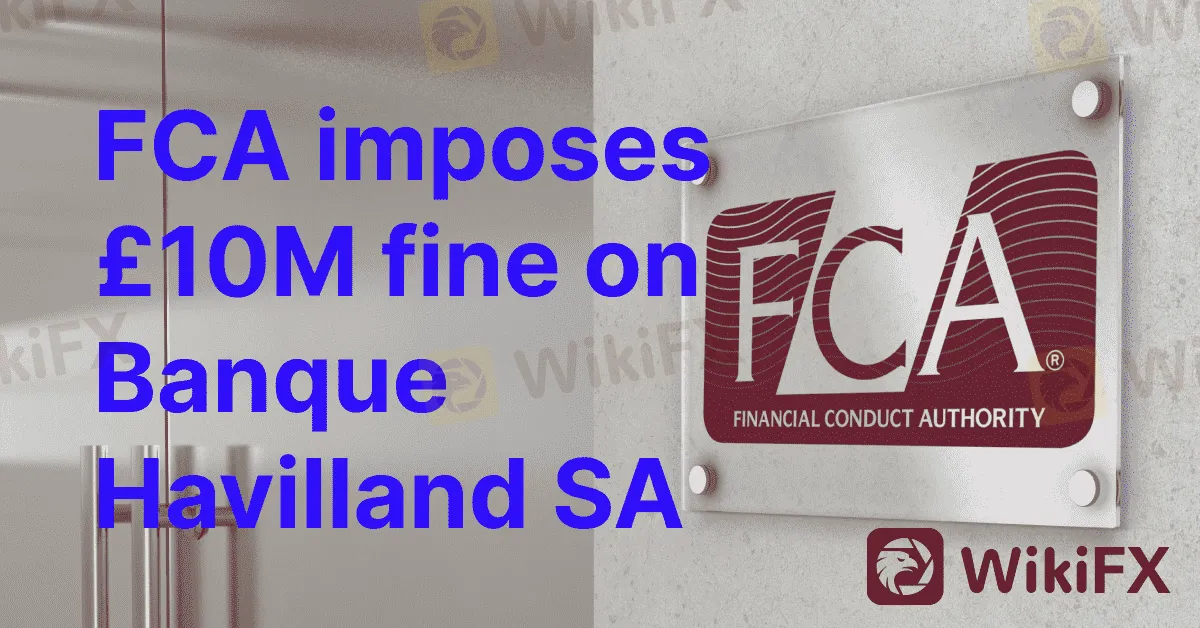简体中文
繁體中文
English
Pусский
日本語
ภาษาไทย
Tiếng Việt
Bahasa Indonesia
Español
हिन्दी
Filippiiniläinen
Français
Deutsch
Português
Türkçe
한국어
العربية
FCA imposes £10M fine on Banque Havilland SA
Abstract:The Financial Conduct Authority (FCA) has imposed a £10 million fine on Banque Havilland, along with penalties on its former London branch CEO, Edmund Rowland, former London branch senior manager, David Weller, and former London branch employee, Vladimir Bolelyy. Additionally, the FCA has banned all three individuals from working in the financial services industry.


(FCA)
The Financial Conduct Authority (FCA) has imposed a £10 million fine on Banque Havilland, along with penalties on its former London branch CEO, Edmund Rowland, former London branch senior manager, David Weller, and former London branch employee, Vladimir Bolelyy. Additionally, the FCA has banned all three individuals from working in the financial services industry.
According to the FCA, between September and November 2017, Banque Havilland acted without integrity by producing and circulating a document containing manipulative trading strategies aimed at creating a false or misleading impression of the market or price of Qatari bonds. The objective was to devalue the Qatari Riyal and break its peg to the US Dollar, which would harm Qatar's economy. Banque Havilland intended to present the document to representatives of countries it believed may have reasons to put economic pressure on Qatar, including the United Arab Emirates, to market its services.
While the FCA has not found evidence that the strategies in the document were implemented, the manipulative trading could have been a criminal offense if it had occurred in the UK.
The FCA has determined that Mr. Edmund Rowland instructed Mr. Bolelyy to draft the document, with Mr. Weller making a significant contribution to its content. Later, Mr. Edmund Rowland and Mr. Bolelyy circulated the document, including providing a copy to a representative of an Abu Dhabi sovereign wealth fund.
The FCA has concluded that Mr. Edmund Rowland, Mr. Weller, and Mr. Bolelyy failed to act with integrity and are not fit and proper to perform any function related to any regulated activities.
The FCA finds the actions of Mr. Edmund Rowland and Mr. Weller to be particularly serious, as both held positions of significant influence and were involved in creating the document.
Therese Chambers, Executive Director of Enforcement and Market Oversight at the FCA, has said that Banque Havilland's conduct actively encouraged the commission of financial crime and that the misconduct of Mr. Edmund Rowland and Mr. Boleyy was deliberate. Additionally, Mr. Weller's behavior was reckless, as he willingly took the risk of impropriety without seeking any assurances that things would not progress further. Such conduct is entirely unacceptable, according to Chambers.

Disclaimer:
The views in this article only represent the author's personal views, and do not constitute investment advice on this platform. This platform does not guarantee the accuracy, completeness and timeliness of the information in the article, and will not be liable for any loss caused by the use of or reliance on the information in the article.
Read more

March Oil Production Declines: How Is the Market Reacting?
Oil production cuts in March are reshaping the market. Traders are closely watching OPEC+ decisions and supply disruptions, which could impact prices and future production strategies.

How to Calculate Leverage and Margin in the Forex Market
Leverage amplifies both potential profits and risks. Understanding how to calculate leverage and margin helps traders manage risks and avoid forced liquidation.

USD/INR, USD/PHP Forecast April 2025
The global forex markets are bracing for April 2025 with divergent forecasts for key emerging market pairs. In particular, the USD/INR and USD/PHP pairs have attracted significant attention amid a mix of central bank interventions, evolving U.S. policy signals, and regional economic shifts. In this article, we review multiple forecasts, examine the driving factors, and outline what traders might expect as the month unfolds.

April Forex Trends: EUR/USD, GBP/USD, USD/JPY, AUD/USD, USD/CAD Insights
Know April’s forex seasonality trends for EUR/USD, GBP/USD, USD/JPY, AUD/USD, and USD/CAD. Historical insights and key levels to watch in 2025.
WikiFX Broker
Latest News
Exposing the Top 5 Scam Brokers of March 2025: A Closer Look by WikiFX
Gold Prices Climb Again – Have Investors Seized the Opportunity?
Webull Launches SMSF Investment Platform with Zero Fees
Australian Regulator Warns of Money Laundering and Fraud Risks in Crypto ATMs
The Withdrawal Trap: How Scam Brokers Lure Victims into Paying More
FCA to Investors: Think Twice Before Trusting These Brokers
Trump\s tariffs: How could they affect the UK and your money
Trump gambles it all on global tariffs he\s wanted for decades
HTFX Spreads Joy During Eid Charity Event in Jakarta
How Will the Market React at a Crucial Turning Point?
Currency Calculator







